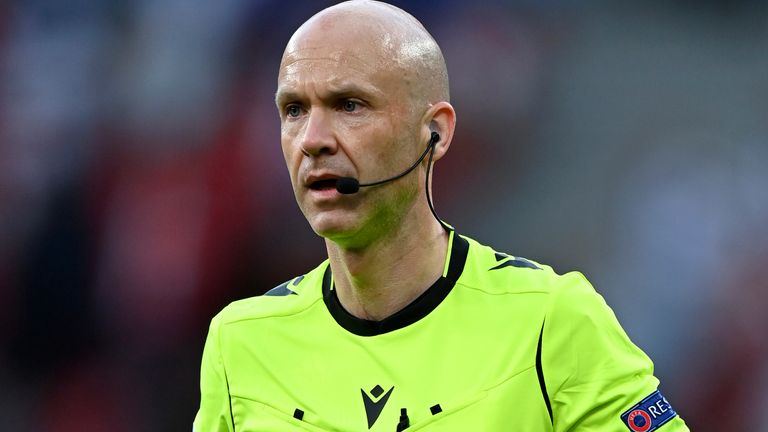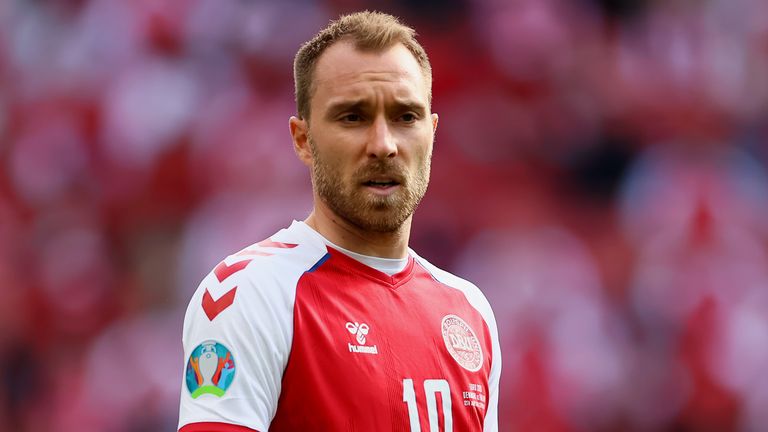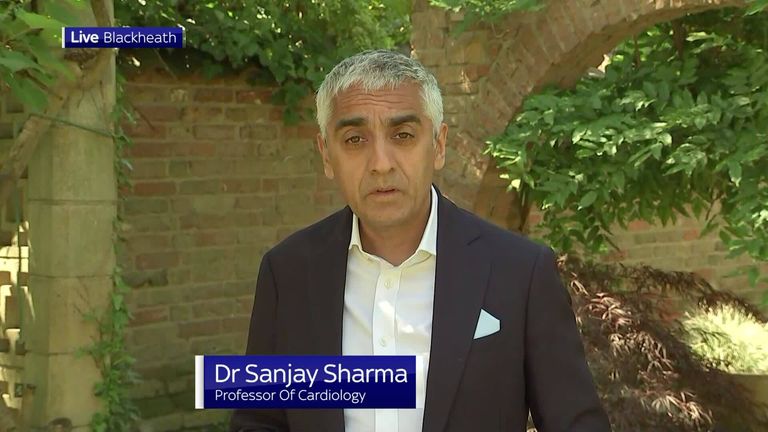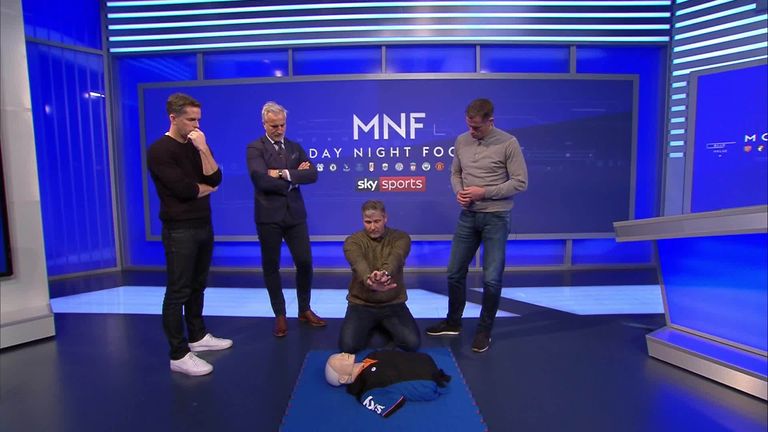Premier League to donate more than 2,000 defibrillators to grassroots football after Christian Eriksen's cardiac arrest
Christian Eriksen collapsed during Denmark's match with Finland at Euro 2020 and only survived after being resuscitated on the pitch; the Premier League, working in partnership with the Football Foundation and FA, is to make the life-saving devices available to sites across the UK
Friday 25 June 2021 17:17, UK
The Premier League has announced it will donate automated external defibrillators to more than 2,000 grassroots football sites in the wake of Christian Eriksen's cardiac arrest at Euro 2020.
Former Tottenham midfielder Eriksen collapsed during Denmark's match with Finland at the European Championship earlier this month and the 29-year-old only survived after being resuscitated on the pitch.
It led to renewed calls for defibrillators to be made more accessible, which have resulted in the Premier League working in partnership with the Football Foundation and Football Association to make the life-saving devices available to sites across the UK over the next few months.
- Anthony Taylor praised for Christian Eriksen rapid response
- Manchester City fund defibrillators for grassroots football clubs
- Christian Eriksen discharged from hospital after successful operation
"The Premier League has today announced it will fund the provision of Automated External Defibrillators (AED) at thousands of grassroots football clubs and facilities, aimed at helping save the life of someone experiencing a sudden cardiac arrest," a statement read.
"Working in partnership with the Football Foundation and The Football Association, the first phase of the Premier League Defibrillator Fund rollout will have AEDs provided to Football Foundation funded facilities which currently are without a life-saving device onsite.
"In the second phase, grassroots clubs that own their facilities will be able to apply for funding for a defibrillator.
"Together more than 2,000 sites will benefit from this investment, with the first 1,000 units delivered in time for the start of the 2021-22 season and the second batch expected in September."
Each grant recipient will be required to have at least one person who has successfully completed the FA Education's free online Sudden Cardiac Arrest course.
Premier League chief executive Richard Masters added: "The traumatic incident we all witnessed when Christian Eriksen collapsed during Euro 2020 brings into sharp focus the need for defibrillators to be more widely available across the football community.
"The welfare of participants and all those involved in football is a priority and this fund will support many people using football facilities not just with the provision of devices but also the training required to use the equipment.
"Sadly, a sudden cardiac incident could happen anytime, anywhere, and we hope by enabling more facilities to have a device, it will make the difference in saving someone's life."
Fabrice Muamba was forced to retire after he suffered a cardiac arrest on the pitch for Bolton in 2012 and welcomed the new initiative.
"I am a big supporter of the Premier League's new initiative to fund defibrillators for thousands of grassroots football clubs," he said.
"I know from personal experience the importance of having access to this type of medical equipment and how vital it is for someone's survival after suffering from sudden cardiac arrest.
"Educating people how to use defibrillators is crucial. I really hope the clubs and facilities will encourage as many coaches, players and staff to undertake the training provided and help create safe places to play the game we all love."
Sports Minister Nigel Huddleston said: "With the devices now accessible in a range of public places - from airports and shopping centres, to train stations and community centres - I'm very pleased that the Premier League is now ensuring that they will be available to protect footballers at grassroots level.
"I urge clubs to take advantage of the Defibrillator Fund and FA's training scheme, and give confidence to players that their health and welfare is the top priority."
What is CPR?
CPR stands for cardiopulmonary resuscitation and is a medical technique that is given to someone who goes into cardiac arrest.
That occurs when the heart encounters an electrical issue and stops pumping blood around the body and to the brain, causing the person to fall out of consciousness and stop breathing.
Medics define this as 'clinical death', which is the onset of biological death, although CPR can help re-start the person's heart functions and save their life.
By administering chest compressions and rescue breaths, the CPR performer helps to pump blood and oxygen around the person's body, taking over the role of their heart and lungs.
How do you perform CPR?
Always seek professional help by calling 999 before starting CPR.
The NHS's advice to carry out chest compressions is as follows:
- Place the heel of your hand on the breastbone at the centre of the person's chest. Place your other hand on top of your first hand and interlock your fingers.
- Position yourself with your shoulders above your hands.
- Using your body weight (not just your arms), press straight down by 5 to 6cm (2 to 2.5 inches) on their chest.
- Keeping your hands on their chest, release the compression and allow the chest to return to its original position.
- Repeat these compressions at a rate of 100 to 120 times a minute until an ambulance arrives or you become exhausted.
The British Heart Foundation recommends that in an emergency situation it is better to try and perform CPR, even if unsure, rather than to not do anything at all.
For more information on FA medical courses which can help to deal with such things as cardiac arrest and how to treat them, visit the FA Bootroom.







